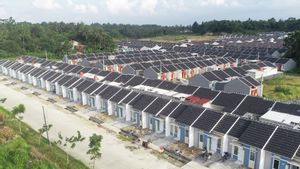JAKARTA - Bitcoin miners in New York state faced a regulatory blow on Thursday, June 30. This happened because the state refused an air permit for a gas-fired power plant used to mine Bitcoin.
The decision is the latest step the New York government has taken to crack down on crypto mining as it tries to fulfill its goals on climate change.
The decision was made for Greenidge Generating Station in New York's Finger Lakes area. Bitcoin mining brought new life and new controversy to the embattled factory in 2020. It sparked anger from some locals who were concerned about how the factory could affect fish and tourism by dumping hot water into nearby Lake Seneca.
At the state level, the Greenidge plant has sparked concerns that pollution from the energy-intensive Bitcoin mining process could revive another zombie power plant and thwart New York's climate and eco-friendly targets.
New York state set a goal in 2019 to cut greenhouse gas emissions by at least 85 percent over the next few decades. The Greenidge case has been a test of how serious the state is in meeting that target.
Are they willing to go tough on the lucrative Bitcoin industry that has been booming in New York since China kicked out miners last year?
The New York Department of Environmental Conservation eventually determined that Greenidge's operations "would not be consistent with the statewide greenhouse gas emission limits set out in the Climate Act."
Greenidge operated as a coal-fired power station for decades. But as coal struggles to compete with cheap natural gas across the country, the plant closed temporarily before retrofitting itself to use gas in 2017.
Then, in 2020, the factory operator saw a more profitable venture and started mining Bitcoin, which now generates most of the revenue for the company.
Bitcoin is the most polluting cryptocurrency, not only because it is the most popular digital currency but also because it relies on energy-hungry security mechanisms to maintain the accuracy of the ledger.
To verify transactions and earn new tokens in return, Bitcoin miners use specialized computers to solve ever-increasingly complex puzzles. All that computing power requires a lot of electricity, which results in greenhouse gas emissions and other pollution if it comes from power plants that run on fossil fuels.
Greenidge's air quality permit expired last year, and has sparked a huge debate over whether the permit should be renewed since it was issued before the factory started mining Bitcoin.
Before crypto mining entered the picture, Greenidge was expected to function primarily as a “peak generator” that would start whenever the network might need additional electricity to meet high demand.
Greenidge can still send power to the network when stressed, but it also works around the clock to mine Bitcoin. That is why advocates of the green environmental movement are increasingly concerned about the pollution.
The plant operator says the plant is carbon neutral because it pays carbon offsets to try to balance its pollution impact on the climate. But carbon offsetting, which typically involves investing in renewable energy, tree planting, or forest conservation, has a history of failing to lead to real reductions in the planet-warming CO2.
VOIR éGALEMENT:
This is the second decision the state has made this month prioritizing climate targets over cryptocurrency operations. Earlier this month, the state legislature passed a law establishing a two-year moratorium on new permits for fossil fuel power plants used to mine energy-hungry Bitcoin and cryptocurrencies while the state conducts a study of their environmental impact.
The next litmus test for New York's commitment to climate action is whether Governor Kathy Hochul vetoes or signs the bill into law. However, the moratorium will not apply to Greenidge, which has essentially been excluded as long as the existing permit is successfully renewed.
“This is the first step in addressing energy consumption and climate issues with crypto mining, and we are still waiting for the governor to sign legislation that will address these issues more broadly. But for today, we celebrate," said Elizabeth Moran, a policy advocate for the non-profit environmental law organization Earthjustice.
Today's decision will not necessarily close the factory. Greenidge is expected to appeal the decision and continue operating as is.
"We can continue to run uninterrupted under our existing Title V Air Clearance, which is still in effect, for as long as necessary to successfully challenge this arbitrary and capricious decision," the company said in a statement also cited by The Verge.
The English, Chinese, Japanese, Arabic, and French versions are automatically generated by the AI. So there may still be inaccuracies in translating, please always see Indonesian as our main language. (system supported by DigitalSiber.id)













